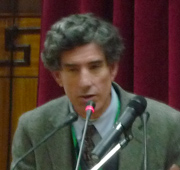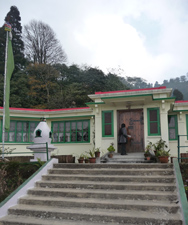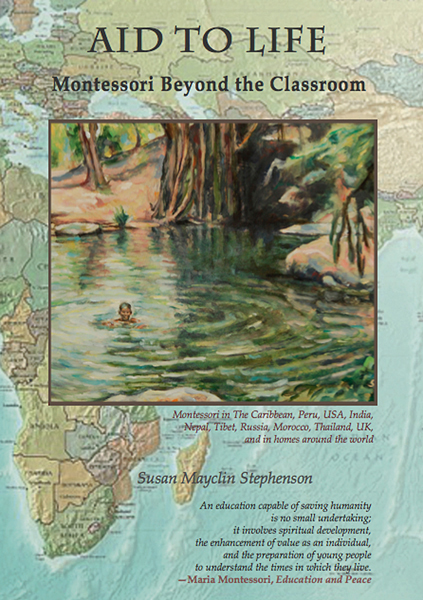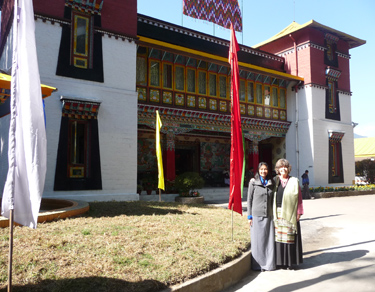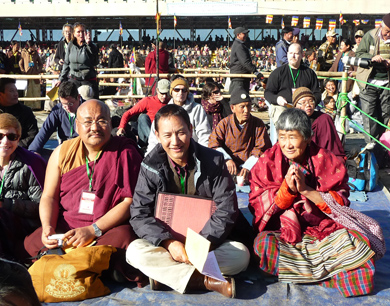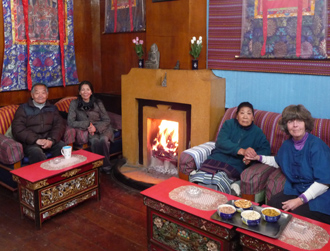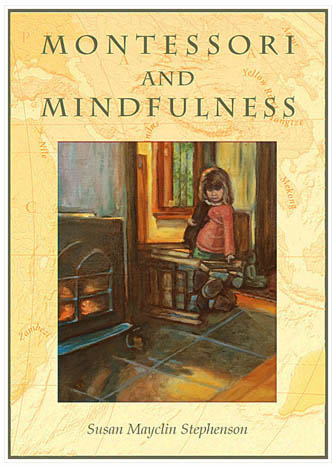Montessori contributes to conference |
|
|---|---|
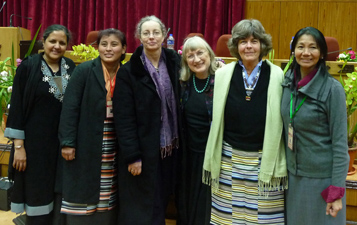 |
|
| Above: the Montessori contingent present at the conference: Cheryl Ferreira (3-6 teacher trainer), Jampa Palmo (3-6 teacher in Dharamsala, India), Lynne Lawrence (Executive Director of AMI, Association Montessori Internationale, Amsterdam, Holland), Jean Miller (AMI 6-12 teacher trainer), Susan Mayclin Stephenson (0-12 teacher/consultant), Lhamo Pemba( 0-6 teacher) |
|
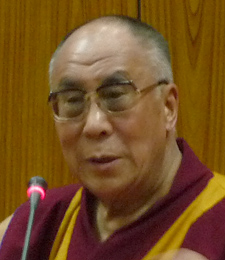 |
Along with progress in many areas such as medicine and the material standard of living, Western culture has brought difficulties to the Himalayan region: materialism, TV violence, daily stress, discord, drugs, teenage problems, etc. In its wisdom the government of Sikkim has brought together a stellar group of scientists, medical doctors, philosophers, thinkers, and educators, in hopes of solving these problems through the education of children, and of adults—especially those adults working with children. Here is a brief report. MONTESSORI NEWSLETTER #6, |
| Forward to friends — Share on FaceBook | |
Notes from the conference presentations, and excerpts from emails sent home, is shared by permission of Susan Stephenson who was there. When Montessori education is carried out properly, that is with long periods of concentration uninterrupted by schedules and assignments, children naturally enter a meditative state followed by happiness and concern and care for others. This element, and the fact that Montessori children enjoy learning and so make great academic and social progress, is a great contribution to the plans of education in the Himalayan region. THE CONFERENCE: BACKGROUND: Adele Diamond is a neuroscientist researching executive functions of the brain in children—functions supported by Montessori educational principles. She was the keynote speaker at the AGM (Annual General Meeting) of the Association Montessori (AMI) Internationale in Amsterdam in 2010. As a result of a presentation she gave at a Mind and Life meeting in Dharamsala, India she was invited to speak at this smaller, private conference. Adele arranged for several Montessorians to attend, including Lynne Lawrence and Jean Miller, who gave presentations, and 4 others, including myself, with a variety of connections to the Himalayan region, who served as observers. The government of Sikkim allots 20% of its budget to education and the teachers are the highest paid in all of India. The government is very serious about education because the rate of suicide of teenagers is on the rise as it is everywhere Western modern culture is introduced. They hope that an improvement of education will change this. They covered the complete cost of everyone invited to attend, hotel, food, local transportation. Lhamo and I would like to thank the Michael Olaf Company and friends in Amsterdam, Beit Jala Palestine, Rome, and the USA, who covered our very expensive travel expenses. There were 40 speakers and 80 of us observers/commenters It would be impossible to cover the entire conference so I will just list some of the speakers and information of interest to readers of this newsletter. The conference was opened by traditional lighting of lamps, chanting by monks, and an address by the Dalai Lama. He told us of his life-long interest in science and quoted Buddha, Investigate and experiment, do not accept my teachings out of faith and devotion, as a directive to investigate everything scientifically. His opening speech, beginning in Tibetan, and then English: OPENING TALK BY THE DALAI LAMA
PICTURE: The Dalai Lama with Adele Adele Diamond, PhD, leader in Developmental Cognitive Neuroscience: Brain research shows the importance of learning by doing and repetition. She emphasized that programs (like Montessori) that address the whole child (cognitive, emotional, social, spiritual, and physical) are most successful at improving any one of them. To understand that practicing compassion makes a person happy children need to experience this, not just hear about it, and it must be repeated and practiced daily. Two further points she made: (1) Stress, even minor stress, impairs learning. (2) To train the brain children benefit from some memorization, such as poetry, even though in this information age memorization is not generally though of as valuable. Here is her website: http://www.devcogneuro.com. Lynne Lawrence, Executive Director of The Association Montessori Internationale (AMI), and 3-6 teacher trainer: The curriculum must allow for the child to be responsible for the learning and we must explore ways to create a social environment in which each child is able to contribute to the other and to the environment; where doing what is right is a natural consequence of daily life, otherwise social and moral education are just subjects on the curriculum.
PICTURE: Richard Davidson Prof. Richard Davidson, Ph.D. (Psychology, Psychiatry, brain researcher) is also a regular speaker at the Mind and Life meetings. He shared a quote by WIlliam James that all Montessorians can relate to (from The Principles of Psychology, William James 1890, Chapter XI, Attention): EFFECTS OF ATTENTION (Principles of Psychology, 1890) And the faculty of voluntarily bringing back a wandering attention, over and over again, is the very root of judgment, character, and will. No one is compos sui if he have it not. An education which should improve this faculty would be the education par excellence. But it is easier to define this ideal than to give practical directions for bringing it about. davidson Dr. Tenzin Negi, PhD, clinical researcher with Emory University and NIH on the effects of compassion meditation on the experience of depression. Instead of education focusing on only on acquisition of knowledge and intellectual skills it should include emotional and social skills as well as moral and ethical development. This will reduce bullying, suicide etc. His career has focused on the potential of the mind to affect well-being on physical, emotional, and mental levels and is now centered on clinical research on the behavioral, immune and stress impacts of meditation. info Jean Miller, PhD, AMI 6-12 teacher trainer in Asia, Australia, Europe, North America. She described research in Montessori schools where children were put in charge of their own social behavior and class rules, and given responsibility for their own education. One interesting result was the children's desire to have school be an hour longer each day because of their ownership of their education. The school was able to allow for this. She spoke at length about social and emotional learning. (TEXT IN PURPLE in the emails home, to the right, also describe the details of the conference) Here is a list of some of the other presenters. Everyone contributed to a wonderful degree. I was so fortunate to be able to get to know many of them during our meals, evenings in the hotel, and bus rides or walks back and forth from the hotel to the conference. What an amazing group of people: Lopen Karma Phuntsho info Sikkim email, December 7, 2010 On 13 December I leave: (flights) San Francisco; Dubai, UAE; Delhi, India; Bagdogra, India. Then (by car) to Darjeeling, India. Lhamo will meet me in Darjeeling and we will stay with her family. Together we will go by car to Gangtok, Sikkim for the 4-day meeting and then return to Darjeeling for a rest before starting home.
Sikkim emails home, December 17, 2010
PICTURE: The Pemba Home, Darjeeling After 40 hours of travel I am in Darjeeling, staying in a British style home that was built when India was a crown colony. Darjeeling was a hill station for the British who came to the Himalayan foothills for relief from the intense heat of the plains of India during summer. After partition of India and Pakistan when the British left India, it was finally bought by the Pemba's, the Bhutanese/Tibetan family I am staying with. This morning I found Mrs. Pemba in the family altar room praying; she took incense into each room of the house, chanting prayer blessings. Together we had a very British breakfast of milk tea, fried egg, toast with cheese, butter and jam, and then she took me around the house explaining all of the family photographs and artifacts. She is Bhutanese but her husband Dr. Pemba (a Western MD trained in London) was born in Tibet and was there when the Dalai Lama was discovered as the reincarnation of the previous Dalai Lama and brought to Lhasa as a young child. Today I visited the Dali Monastery next door, and the classrooms of the young monks who are from 6-12 years old, worked in the clinic, had rice in the monastery for lunch, took a taxi to town to find an internet cafe (12 people in the small taxi, about 20 cents each fare) and was prevented from coming home because of a giant Muslim celebration that blocked traffic for an hour. The celebration is called Hasha Hucha and remembers two brothers, sons of a king, who fought over succession and one was killed. There were loud drums and decorations and men taking turns pretending to fight to the death with wooden swords. Sikkim emails home, December 20, 2010
PICTURE: Elders at the Monastery Saturday I finished working at the clinic - sorting the patients record books into numerical order - 500 patients. I would love to have been able to talk to the patients, especially the 13 elders living in little rooms, cared for by the monastery, but I do not speak their language. Smiles and gestures and laughter sufficed! In the evening I was treated to Tibetan momos and Tibetan tea by my friends Tsewang and Tsomo. We have been in touch for some years as Jim and I help with the tuition for their son. It was wonderful to be able to meet them in person, something none of us thought would happen. Yesterday morning we left Darjeeling for the 4 hour drive to Gangtok Sikkim. In the house in Darjeeling it has been so cold that we could see our breath all day in the house. But the drive to Sikkim was through a lower elevation where we drove through the tropical scenes of banana trees and monkeys. We stopped to threw a coin over a bridge into a river to bless the trip. Even though Sikkim is officially a part of India it is a very secure area and I had to present papers and have my passport stamped. Sikkim has always been a main road between Tibet and India. This is the reason for the emphasis on security. A poster at the passport office announced that smoking in public is forbidden in this little kingdom, but upon arrival in Gangtok I saw a young man sneaking a puff. When I shook my finger at him he looked scared to death and hid the cigarette behind his back, so I won't be doing that again. The first day of the conference! I have learned that, inspired by the Mind and Life meetings, it was the Dalai Lama who suggested that this conference occur here in Sikkim. Everything, including hotel, meals, local transportation, is covered by the government of Sikkim and we are all treated as honored guests. We were met at our hotel, one of 4, with the honorific katas, white silk scarves presented as a welcome, many people to meet our every need, a lovely room with a balcony overlooking Kunchanjunga, a 5-peak Himalayan mountain covered with crystal white snow. After breakfast, again very British, of egg, toast, butter, jam, and tea, we were taken to the conference center for the opening ceremony. A few of us had been issued special invitations and were taken to the government mansion and served a very special Indian lunch after which we were invited to meet the Dalai Lama. We only had one kata among us Montessorians (Lynne Lawrence, Jean Miller Elementary trainer, Cheryl Ferreira primary trainer, Lhamo, and myself) so Lhamo gave it to Lynne to present to the Dalai Lama. He accepted it and then handed it back to her. She turned to me and asked what she should do with it and I told her she should keep it forever, as I have the one he gave me in Dharamsala in 2002. The speeches in the afternoon session were brilliant!!! a group of people who, as all those who reach the limits of their fields, know that there is more—that modern science can measure and describe, but then they are at a loss for a true description of reality. I know I am not expressing myself well, and I wish I could share with you every thought that has gone through my mind today. But one thing is made clear: if we are to really effect positive change for the good of mankind, through the education of children, we cannot do so by merely focusing on academics. Social and Emotional Learning, training in compassion, concentration and self control, must be at the center of what we give children. |
"Montessori Teachers with the Dalai Lama in Sikkim" is just one of the beyond-the-classroom chapters in this book. More information here: AID TO LIFE Sikkim emails home, December 25, 2010
PICTURE: Lhamo and Susan in front of the Namgyal Institute of Tibetology There was one instance during the bus trip returning to the hotel after lunch that reminded me that we are indeed in Asia. Part of the road had collapsed and a jeep was stuck blocking the road. The bus had to maneuver an inch at a time slowly back and forth with people yelling directions and helping. It is a great feeling of community and working together that is so common. One of the speakers jumped out and directed traffic with the help of many other people in street. Everyone applauded him when the bus cleared the jam and he came back in. He replied happily that he was a quick learner and now knew, quoting the Dalai Lama, that it was more important, in the pursuit of happiness, to constantly look for opportunities to be of service to others instead of oneself! We all laughed along with him with joy. The conference finished on Thursday, but because of the interest of many people about the educational future of Sikkim all of us Montessorians were invited to attend a further meeting yesterday with the government officials. It was held at NIT, the Namgyal Institute of Tibetology. Right now the government allots 20% of the budget to education and the teachers are the highest paid in all India, but there are many suicides of high school students as is the case throughout the Himalayas wherever modern culture and stress is introduced and this is considered a failure of the educational system. We just happened to run into a young man who here who used to be a banker and so he has an apartment in London that he can rent out to support his real passion with is to be a journalist. He sent in an article yesterday, to the Times of London, and since one must pay to access the Times online he also published it on his blog. Here it is for those who are interested in the perspective that the Times was interested in (there are MANY perspectives) http://luddo.com/2010/12/23/buddhists-the-brain-and-neuroscience On Wednesday,the 3rd day of conference, Lynne Lawrence gave a brilliant introduction to Montessori in 10 minutes in front of the Dalai Lama and our small audience. She showed lovely Montessori classroom pictures from Africa, Asia,and the West, rich and poor, emphasizing children caring for each other, and ending with a child's quote; after the child had worked with the small globe he said "This is my world. Now I understand, we are all the same, we just have different names." The Dalai Lama has arrived to our little group after speaking for 5 hours to 10,000 people who had come from far and near to her him. He looked exhausted, leaned over and toward the translator even rested his head, with a white cloth he kept patting his head. 9 people had been invited, speakers at the conference, to present especially to the Dalai Lama the essence of their work. Lynne was the 5th. When she began to speak and to show the pictures he looked up, sat up, and paid special attention. At the end of all 9 short presentations he conferred with his translator and we heard the word "Montessori" and then he said "Montessori is wonderful"; then he quoted Lynne "Education should teach children to say "This is my world" (looking at Lynne). It was a proud moment for all of us representing Montessori to this very special group of people.
PICTURE: The Khangchendzodnga mountain shown here greeted us each morning. Above is the view of Mount Kanchendzonga I see each morning as I open the door of our hotel room onto the balcony. FOOD: This morning at the hotel breakfast buffet I poured myself some tea and then asked for hot milk. Both of the young boys who were manning the buffet looked at me in shock, "But madam, this is Darjeeling tea. Milk will ruin it!" I apologized and said I would find someone who wanted Darjeeling tea, which I did, and then returned for the other black tea, also from India. For lunch at the conference we had the famous Sikkim nettle soup, and, among other things, a dish of orchid leaves and nutrella (no not nutella, but a kind of dehydrated dried tofu) For dinner tonight: Dal Makhani, Aloo palak (potato), Paneer Begam Bahar, Veg hydrabadi, three breads (roti, baby naan, papad) and for desert a kind of bread pudding with dried cherries and a cover of extremely thin silver paper made by being smashed with animal intestines. (I am a vegetarian and could not eat the desert) A few days ago was the solstice and the full moon, it was also our "Montessori Christmas celebration, with a lovely Indian meal at the most beautiful of the 4 hotels all of the conference attendees are staying in. Lhamo and I had brought a Christmas cake from Darjeeling, I gave everyone a greeting card with an image of one of my paintings, and Lynne (Lawrence) gave everyone a special box of chocolates. One of the people at our dinner was a great surprise for me. Jampa is a Montessori teacher at TCV, Tibetan Children's Village in Dharamsala, India, where I gave talks in 2002 and we remembered each other! It was such a treat to get to spend quality time with these old friends. Jampa had pictures of TCV classes on her thumb drive that Lynne put on her laptop for us to see, and then showed us pictures of her own work with internal refugees in East Africa. We are all so busy that it is extremely rare to get together and actually share our lived. As we cut the Christmas cake Jean Miller, great musician led us all in a Christmas song and at the end of our dinner others in the restaurant came over and commented on what good friends we must be to be having so much fun together.
PICTURE: The Dalai Lama teaching The second morning of the conference we were up earlier than ever to go to the Dalai Lama's public "teaching" in a huge outside auditorium. There were at least 10,000 people (the two local newspapers said 80,000 and 100,00) who had come from Bhutan and all over India and Sikkim to attend. Since our Science, Spirituality, and Education conference is the reason for his presence in Sikkim we had a special place near the front. Then we were invited to sit up on the stage with the Dalai Lama, but this would have meant 3 hours of only listening to Tibetan language and one of the lecturers at the conference, and the Dalai Lama's official translator, had already offered to translate for the small group of us down on the ground so we stayed there.
PICTURE:Susan sat with these four people from Bhutan: Dr. Francoise Pommaret, Lopen Lungtaen Gyatso, Dr Lopen Karma Phuntsho (also lecturer at Cambridge, U.) and Lopen Karma's mother, from Eastern Bhutan His main message, as at the conference, is that Buddhist philosophy is, and has always been, a method of attaining happiness through ones own attainment of self-control of our minds, and especially by our actions of helping others. That our actions and work for others is far more important than anything else. It is not a religion and its wisdom is available, and certainly accepted, by many people who are also devout practitioners of their own religions, THE CONFERENCE: I am thrilled and at a loss of words to share the quality and excitement of this meeting. Anthropologists, physicists, MD's in both Western and Traditional medicine, Tibet scholars, educators, philosophy professors. All dedicated to bringing together ideas to really make a difference in the world. I don't believe I have even in my life, even at Harvard, been in the same room with a collection of intelligence and wisdom as this week. Usually, at any kind of a meeting or even plays and concerts, I seat myself near the door if possible because I get bored so easily. But I have been at the edge of my seat at each presentation, listening to every work, and sorting and classifying and arranging my brain with these new perspectives on life and our purpose here on earth,
PICTURE: Susan in Darjeeling with Dr. and Mrs. Pemba and their daughter Lhamo. Now I am back in Darjeeling with the Pemba family. Lhamo Pemba is only a single mom and Montessori teacher back in the USA, but here she is a member of one of the most influential families in the area, a family dedicated to helping others. She is Bhutanese/Tibetan, AMI trained 3-6 in London, and 0-3 in Denver, teaching at The Cobb School Montessori in Simsbury, Connecticut) She grew up in Darjeeling and has connections with several of the conference speakers and the head of the Monastery where the meeting is to be held. She is close to the royal families of Bhutan, Sikkim, Tibet, and is fluent in Tibetan, Dzonkha (language of Bhutan), Hindi, Nepali, and of course English. For years she taught English to the young monks at the Dali Gompa (the huge monastery next to their home) and was a founding member of the famous Manjushree Centre of Tibetan Culture ( www.manjushree-culture.org ). Today they opened the center especially because Lhamo and her cousin (a Tibetan scholar at Oxford, Yale, etc., living in Vancouver, in demand all over the world) wanted to see it. If anyone wants to come to the best place to study Tibetan language I recommend this center.
PICTURE: typical attempt to keep the streets clean Of course one must know that this is still India with all of the third world inconveniences, toilets that do not flush, regular loss of electricity, trash, loud rush of cars, tuk-tuks, and motorcycles. But so many people are dedicated to preserving what is best of the ancient cultures of this area so it is worth it. This morning my room, even with the small electric heater going all night, was 47 degrees. I sleep in long underwear and tons of blankets and a container of hot water bottle. Yes, it is worth it. In the morning, December 26th, I began the trek home: 3 hour drive to Siliguri, overnight in a hotel, then flights: Gangtok to Delhi, Delhi to Dubai, Dubai to San Francisco and then on to Arcata for a late and so looked-forward to family Christmas. Merry Christmas to all and to all a good night. Previous Michael Olaf Newsletters: Susan Mayclin Stephenson Book inspired in part by this meeting:
Available from the publisher: Michael Olaf ALL nine of these "First Montessori Books" are now available from Amazon as ebooks in 170 countries, and as print books in many countries. Check this page to see if you can order: |
Page updated January 19, 2023 Return to Michael Olaf Montessori Home: MO |
|

